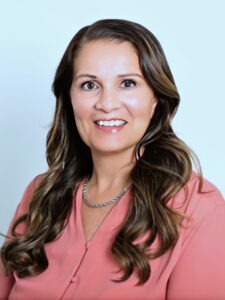
Driven by her compassion and desire to support her community, Karen Bell first earned a degree in criminal justice from Carleton University in Canada in 1982. She began her career with the Ottawa-Carleton Detention Centre before joining the Toronto Police Service. In 1991, she became a sergeant with the Anishinabek Police Service, where she brings considerable expertise in administration, law enforcement, human resources, and care and compassion for victims of crimes and other vulnerable individuals. With the Anishinabek Police Service, Ms. Bell is responsible for public accountability, evaluations, reviewing human resource matters, assisting with organization and restructuring, and adding new community services.
Ms. Bell has made a name for herself through her vigor, her focus on her goals, and her team. As an Indigenous woman in Canada, she is proud to bring her culture, compassion and understanding to her workplace and strives to be a good role model for young women and provide for future generations. Looking toward the future, Ms. Bell has begun thinking about retirement, though she intends to remain active by volunteering on boards and running for leadership positions within her community. Currently, she wants to utilize her experience in leadership and community needs and dynamics to run for the position of chief of her community, feeling strongly that the community is ready for a strong female voice.
While her retirement will shift her focus entirely to community work, Ms. Bell has been closely involved in a number of civic endeavors throughout her career. She spent 10 years on the board of the Phoenix Rising Foundation and also sat on the boards of the Indigenous Welfare Agency and Victim Services of Algoma. In addition, she was a big sister with Big Sister Little Sister and worked with Female in Crisis. For the past six years, she has been a council member for Garden River First Nation and also contributed to the elders committee. Furthermore, Ms. Bell was coaching staff for several hockey groups, including Team Ontario, an all-Indigenous women’s hockey team, and the National Aboriginal Hockey Championships, for nine years.
Having accomplished much over the course of her career, Ms. Bell hopes to leave a legacy as someone accountable, transparent and open, who is always willing to listen and get back to others. For her excellence, she was recognized by the Sault Ste. Marie Business Women in 2000, having previously been honored with the Gold Duke of Edinburgh Award in 1980. Her involvement in hockey led to her being awarded a Medal of Merit by the Women’s Hockey League of Sault Ste. Marie, Ontario. A distinguished Marquis listee, she has been named a Marquis Who’s Who Top Professional and presented with a Marquis Who’s Who Humanitarian Award. Above everything, Ms. Bell considers the most gratifying aspect of her career to be giving back to her Indigenous community.
Attributing much of her success to her personality, Ms. Bell is also deeply grateful to the mentors she had throughout her education and career, including her colleagues and her parents, who instilled in her a strong work ethic. The most important lesson she learned was not to take anything for granted. People’s circumstances and situations change, so you can’t expect the same thing from people at all times, and it is important to keep an open mind without making assumptions.
Ms. Bell notes that there will always be difficult periods in life, and she strongly believes that perseverance is vital for making it through to the many rewarding aspects of life. To young and aspiring women professionals, she would emphasize not letting anyone tell you what you can or cannot do. When she isn’t working, Ms. Bell enjoys boxing, competitive hockey, traveling, and spending time with her family, which includes her husband, Ken Casola; her son, Jacob; and her granddaughter, Amaya Bell.
